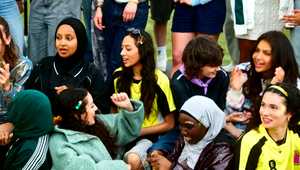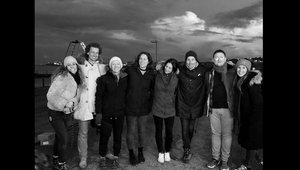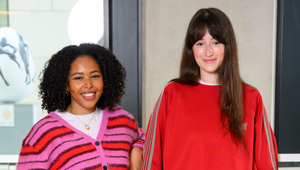
Your Shot: How Deutsche Telekom Are Taking Their Fight Against Dementia into VR

In a world of late capitalism where people are sick of experts, life-saving scientific research struggles for funding while telecommunication companies make billions in profits. Thankfully, some of that money is being put to use for the good of humanity.
In 2016, Deutsche Telekom launched Sea Hero Quest, a mobile game that collected masses of data contributing towards dementia research while people played. It became the world’s largest dementia study of its kind, collecting reams of useful data from nearly three million people worldwide, which equates to over 12,000 years’ worth of research. This allowed scientists to establish the first worldwide, cross-cultural benchmark for human spatial navigation - a vital tool in early diagnosis of dementia. It was also showered with awards and coverage, deservingly.
Wolfgang Kampbartold, Vice President of International Marketing Communications at Deutsche Telekom AG, was astounded by the results of the original campaign. “The original target we set out was 100,000 downloads,” he remembers. “I had a real fight with my boss at the time because I tried to Google what was there in terms of such a game. There was only one available. They were heavily investing in paid media to push it. And they reached 150,000. I think we got 100,000 in the first eight hours or so after launching. The success for us has been overwhelming.”
Now Deutsche Telekom, in collaboration with creative agency Saatchi & Saatchi and game designers Glitchers, have followed up the mobile game with Sea Hero Quest VR - the world’s first consumer focussed virtual reality game to help scientists fight dementia through gameplay.
Consisting of up to six challenges, the VR game provides a more immersive and intuitive experience than the original mobile game. Players can participate in challenges where they find their way through checkpoints on a map, fire a flare at a target and navigate a maze full of sea creatures who need feeding. Every move is recorded, providing rich data on spatial navigation that can be used by researchers. The game was developed to work with the Samsung Gear VR and is also available to be downloaded for free from the Oculus Store.
“The client could have just stopped at the mobile game,” says Saatchi & Saatchi Creative Director Franki Goodwin. “They got so much fame, won a ton of awards. They did it because it was the right next step and once you’ve started on something you should keep going. That’s what’s really commendable and brave about this.”
Playing this role in dementia research chimes with Deutsche Telekom’s marketing aims. “Deutsche Telekom, from a brand perspective, is a sharing company,” says Wolfgang. “We try to lay claim to the ground of sharing. This is what we enable with the services and products we offer. So, what do people lose when they develop dementia? They lose their ability to share. We lose our business opportunities. People only share what’s in their memory, which also means what happened two minutes before. That’s why we set out to safeguard sharing. We needed to benchmark human navigational skills on a global scale.”
Taking the project on to a new VR platform seemed natural to Deutsche Telekom. “We find ourselves in an industry where everybody tries to kind of just derive money from the market. We thought that’s not good enough. We think there’s also a duty. We call it our ‘digital duty’ - using our products and services to be at the forefront of technological development, but also for making people’s lives better. Because VR is in the world, we feel obliged to make use of it to bring it to where we already are and see what we can do with it.”
It was a brave move, in a world where brands often demand VR experiences for the wrong reasons. “It does feel to me that people are trying to find a role for VR within their businesses,” says Franki. “VR is very difficult because of the isolation experience. And especially for a brand like Deutsche Telekom where ‘Life is for Sharing’ is what they live and breathe - as their agency we would never put a picture of someone using their phone alone on a mood board because that’s not a shared experience. That’s the problem with VR from an advertising point of view. It’s impossible to share that experience. You have to be able to share the benefit of it, which takes you to a scientific place.”
From a scientific perspective, taking Sea Hero Quest to VR makes perfect sense. “This is again another world first for this kind of project,” says Dr Hugo Spears, of University College London. “There isn’t a comparable one out there.”

As a scientist, Hugo was naturally sceptical at first. “We don’t just jump on an idea and say ‘that’s cool.’ We do a lot of background checking. So, in the period leading up to this we looked at it and could see quite quickly that this is really quite remarkable.”
Data from almost three million players of the mobile game has allowed scientists to ask questions about things like how culture around the world affects navigation ability. “Fundamentally, nobody’s ever asked that question,” says Hugo. “It turns out that because of Deutsche Telekom, the first ability we’ll know about from a worldwide perspective will be spatial navigation. We think it’s critical for diagnosis of this horrific disease. When we went into the VR we could work out which levels we’d like to repeat so we could cross check that all this works. It has affected the way we can drive the science.”
Admittedly, the limited proliferation of VR technology means that this experience will reach far fewer people. Wolfgang will be happy if they get to 10,000 in the next six months or so, he admits. VR is still niche. But the level of detail the VR experience provides is far deeper, with a much higher level of tracking precision (tracking yaw (y axis), pitch (x axis) and roll (z axis) data. Sea Hero Quest mobile collects gameplay data every 0.5s whereas Sea Hero Quest VR collects gameplay data every 0.1s. Whilst collecting more data points per second does not speed up the rate of research collection (between the mobile and VR games), it hugely increases the precision of the data collected. Previously, data collected by Sea Hero Quest mobile could determine the orientation of the player within 22.5°. With Sea Hero Quest VR, this has been narrowed down to within 1.5°, giving scientists navigational data that is 15x more precise, allowing them to form deeper insights about human spatial navigation abilities.
“When you go into VR you get all these head movements that you wouldn’t get if you just saw the boat move around,” explains Hugo. “This could be really exciting for the diagnostics. We don’t know - we’re on a scientific journey. And if you didn’t sample at the rate we’ve provided it wouldn’t make sense for the data. So, you have to do this. Phones have got the technology to do it and, for the science, it’s really good.”
The VR version also includes an experiment which wouldn’t have worked well on the mobile game - the Morris Water Maze, which is a widely-used tool for studying spatial memory and learning. The scientists wanted to include it in the mobile app, but soon discovered it wouldn’t work. “So when the project arose to go back, we could implement ideas we had a year ago and now we’ve gone back they will actually work,” enthuses Hugo.
Franki emphasises that Saatchi & Saatchi’s role as creative mediators between the various parties involved was key to progressing in this project. “Scientists aren’t focused on design, user experience or communications,” she says. “They’re focused on outcome. And when those two worlds come together, our expertise as communicators is relevant. The way we take something that could be a really boring science experiment and turn it into finding and feeding monsters. That is advertising in its purest form.”
The other huge benefit of marrying science to a brand and creative agency is gaining access to world-class technological creative talent like Glitchers. “I don’t think scientists have access to the best,” says Franki. “But we can pick up the phone at Saatchi & Saatchi and 12 people will come in here and pitch for our business. To be able to build other opportunities where those things can come together is great. And in the early stages of VR, when we don't really know what it is yet, and what the strongest role it’s going to play in our lives is, it’s great that we’re part of that and not just waiting until we know how to make money out of it.”
Hugo agrees that allowing these unusual bedfellows to work together is key. “A crucial part of this is because Deutsche Telekom have brought this team together - a whole team of scientists and a whole games company asking each other questions. It’s not a natural thing. They want a shooty, fast, exciting game and we want [something] slow and careful. You have to merge that.”
“The games guys definitely had two taskmasters in the sense that there were two requirements,” says Franki. “Deutsche Telekom are the client. It’s a branded piece of content, but the requirement from them is that it is a real-world, highly functioning scientific tool. I didn’t ever feel that the science and the brand were ever working against each other. It was a balancing act but we were all on the same side.”
“Advertising is changing,” she says. “[Sea Hero Quest] is a collection of people that have to trust each other. And that’s the only way that really tough stuff gets made. My father is a scientist. I called him a couple of years ago to tell him about our ambitions for this project. He said: ‘You do know if this was easy everyone would be doing it.’ Getting the scale, building something that works and has meaningful data coming out. Putting fun and science together is hard. That’s why you have to have experts in both.”















